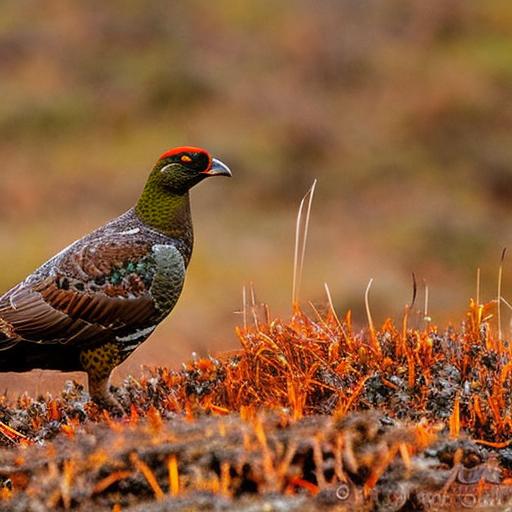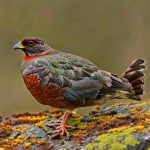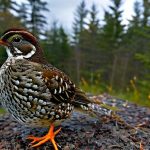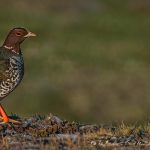Your cart is currently empty!

Maximizing Success: The Best Time of Day to Hunt Grouse Revealed!

Table of Contents
Introduction
Welcome to the world of grouse hunting, a sport that combines skill, patience, and a deep understanding of the wilderness. As an experienced hunter specializing in small game, I’ve spent countless hours in the fields and forests, learning the habits and behaviors of these elusive birds. The key to a successful hunt often lies in knowing the best time of day to hunt grouse. This is not just a matter of opinion, but a strategy honed through years of experience and observation.
Grouse are creatures of habit and their daily routines are influenced by the environment and seasons. Understanding these patterns is crucial for any hunter, regardless of their skill level. The best time of day to hunt grouse can vary, but there are certain periods when these birds are more active and, consequently, more accessible. This understanding can transform an average day in the field into a fruitful endeavor.
In this article, we will delve into the intricacies of grouse behavior and how it changes with the time of day. We’ll explore how the early morning light or the quiet of the late afternoon can affect your hunting success. Whether you’re a seasoned veteran with years of hunting experience or a novice with a newfound interest in grouse hunting, the insights shared here will elevate your hunting skills. So, let’s embark on this journey together and uncover the secrets to determining the best time of day to hunt grouse, ensuring that your next hunting trip is as rewarding as possible.
Understanding Grouse Behavior and Habitat
To truly excel in hunting grouse, it’s vital to first understand their natural behavior and habitat. Grouse, known for their elusive nature, are most commonly found in wooded areas, often near the edges of forests where cover and open land intersect. These birds prefer habitats with a mix of trees and open spaces, providing them with ample opportunities for feeding, nesting, and evading predators.
A typical day in the life of a grouse involves several periods of activity, interspersed with times of rest and alertness. The best time of day to hunt grouse is closely tied to these activity patterns. Generally, grouse are most active during the early morning and late afternoon hours. In the morning, they often leave their roosts to feed, making this a prime time for hunters to locate them. As the day progresses, their activity usually diminishes, picking up again towards the late afternoon as they feed again before nightfall.
Seasonal variations play a significant role in grouse behavior too. During spring, male grouse are often more active and vocal as they display for mating. This can be an opportune time for hunters, as the birds are less cautious and more focused on their mating rituals. In contrast, the fall season sees grouse becoming more wary and elusive, particularly as hunting season commences. During this time, understanding their daily routines and preferred feeding areas becomes even more crucial.
Identifying signs of grouse presence is a skill that can significantly enhance your hunting success. Look for telltale signs like droppings, feathers, and dust baths. Grouse droppings are cylindrical and often found in areas where the birds feed or roost. Feathers can indicate recent activity, especially in areas with dense underbrush where grouse like to hide. Dust baths, shallow depressions in dry soil, are another sign to watch for; grouse use these areas to clean their feathers and rid themselves of parasites.
In terms of behavior, grouse are known for their distinctive walk-and-pause motion. When foraging, they take a few steps, stop to peck at the ground, and then continue walking. This pattern can help hunters identify active feeding areas, especially in the early morning or late afternoon when grouse are most likely to be out and about.
As an experienced hunter, I’ve found that the key to successfully hunting grouse lies in understanding these behavioral patterns and adapting your approach accordingly. Patience and observation are crucial. Spend time in the habitats grouse frequent, observe their behaviors and patterns, and use this knowledge to plan your hunting strategies. By aligning your hunting times with the grouse’s natural rhythms, you can significantly increase your chances of a successful hunt. Remember, each day in the field is an opportunity to learn and improve, bringing you closer to becoming a master of the art of grouse hunting.

The Prime Times for Grouse Hunting
As a seasoned hunter with years of experience in tracking and hunting grouse, I’ve come to recognize the specific times of day when these birds are most active. Understanding these prime times is crucial for any hunter looking to increase their success in the field.
Morning Hunt: The Early Bird Advantage
The early morning, just after dawn, is widely regarded as one of the best times to hunt grouse. During these early hours, grouse are typically on the move, leaving their roosts to feed. This is when they are most active, making them easier to locate. The calm and quiet of the morning also work in the hunter’s favor, as it allows for better sound detection and less likelihood of spooking the birds.
Another advantage of the early morning hunt is the dew on the ground, which can help quieten your footsteps, allowing for a stealthier approach. Additionally, the rising sun casts long shadows in which a skilled hunter can remain concealed.
Evening Hunt: Capitalizing on Dusk Activities
The late afternoon and early evening, just before dusk, present another prime hunting opportunity. Similar to the morning, grouse become active again as they venture out to feed before nightfall. The fading light at this time can be advantageous, as grouse may not be as alert to the presence of hunters.
One of the benefits of evening hunting is the temperature. Especially during early fall or late spring, evenings can be cooler and more comfortable for both the hunter and the dog, if you use one. The lower temperatures can also increase the activity level of the grouse, making them more likely to move around.
Morning vs Evening Hunts: A Comparison
While both morning and evening hunts have their advantages, they also come with distinct challenges and considerations. Morning hunts require an early start, often before daylight, which can be a challenge for some hunters. However, the freshness of the day and the increased likelihood of finding grouse in feeding areas can be highly rewarding.
Evening hunts, on the other hand, require good timing to ensure you’re in the right place when the grouse become active. There’s also the factor of diminishing light, which can make spotting and tracking grouse more challenging as dusk approaches. However, for those who are not morning people or for days when the morning hunt isn’t possible, evening hunts provide a valuable second chance.
In my experience, both times of day can be equally effective for hunting grouse, but they require different strategies and approaches. Morning hunts benefit from the calmness and freshness of the day, while evening hunts utilize the natural behaviors of grouse as they prepare for the night. It’s important to consider personal preferences, weather conditions, and terrain when deciding whether to embark on a morning or evening hunt.
Strategies for Successful Grouse Hunting
Successful grouse hunting requires not just knowledge about the best times to hunt, but also the implementation of effective strategies. Over the years, I have developed several approaches that cater to different times of day and circumstances, always prioritizing stealth and patience.
Tailored Strategies for Different Times of Day
Morning Hunts:
- Utilize the Element of Surprise: In the early hours, grouse are less vigilant and more focused on feeding. Approach feeding areas quietly and keep a low profile.
- Take Advantage of Lighting: Use the early morning light to your advantage. Position yourself with the sun at your back to avoid casting shadows and to keep the grouse from spotting you.
- Target Feeding Areas: Focus on areas where grouse are likely to feed, such as edges of woods or near berry bushes.
Evening Hunts:
- Be Aware of Your Silhouette: As the light fades, your silhouette can become more pronounced. Stay low and use the terrain to conceal your approach.
- Quiet Approach: As with morning hunts, a stealthy approach is key. However, be extra cautious as the birds are more likely to be on high alert as darkness approaches.
- Patience is Key: Evening hunts may require more waiting and observation. Position yourself near known roosting areas and wait for the grouse to come to you.
The Importance of Stealth and Patience
Stealth and patience are the hallmarks of any successful hunting strategy, especially when hunting grouse. These birds have keen senses and can be easily spooked. Move slowly, avoid sudden movements, and be patient. Often, the best opportunities come to those who wait quietly and observe carefully.
Equipment and Gear for Different Times
Morning Hunts:
- Camouflage: Choose lighter camo patterns that blend with the morning light and environment.
- Footwear: Opt for quiet, comfortable boots for long treks during early hours.
Evening Hunts:
- Camouflage: Darker patterns are better suited for late-day hunts.
- Headlamp or Flashlight: As light diminishes, a headlamp can be invaluable for navigating and tracking.
In all cases, scent control is crucial. Grouse have a keen sense of smell, so use scent-eliminating sprays and avoid strong-smelling substances before your hunt.
Grouse Calling Techniques
Grouse calling can be effective, but it requires practice and timing. Calls are generally more effective during the mating season in the spring but can also be used in the fall to lure curious birds.
Morning Calls:
- Use soft, subtle calls in the morning. The stillness of the air can carry the sound further, and a loud call may be unnatural and startling.
Evening Calls:
- As the day winds down, grouse may respond to slightly louder, more aggressive calls, as they become more focused on regrouping or finding a mate.
Remember, the effectiveness of calls can vary, and overusing them can make grouse wary. Use calls sparingly and observe how the birds in your area react to different sounds and techniques.
By combining these strategies with a deep understanding of grouse behavior and habitats, you can significantly increase your chances of a successful hunt, regardless of the time of day. Keep in mind that every hunting experience is a learning opportunity, and adaptability is key in the ever-changing world of grouse hunting.
Related Questions
What Weather Conditions are Ideal for Grouse Hunting?
Ideal weather conditions for grouse hunting are typically cool and clear days. Grouse tend to be more active in cooler weather, making them easier to locate and hunt. Overcast days can also be advantageous, as the diffused light helps to conceal your movements. However, you’ll want to avoid extremely windy conditions, as this can make it harder to hear the birds and for your scent to disperse unpredictably. Light rain can be beneficial, dampening sounds and allowing for a stealthier approach, but heavy rain can lead to less grouse activity as they seek shelter.
How Does the Terrain Affect the Best Time to Hunt Grouse?
The terrain plays a significant role in determining the best time to hunt grouse. In more rugged or hilly areas, morning hunts can be more productive. As the sun rises, grouse often move uphill to feed and bask in the morning warmth. In flatter, more open terrain, evening hunts might prove more fruitful, as grouse venture out of the denser cover to feed in open spaces. Dense woodland or areas with a lot of underbrush can provide excellent hunting opportunities throughout the day, as grouse use these for cover and feeding.
Are There Any Specific Techniques for Hunting Grouse in Different Seasons?
Yes, hunting techniques can vary with the seasons. During the spring, especially during the mating season, grouse are more vocal and can be lured using calls. This is the time to use more aggressive calling techniques to mimic the sounds of a potential mate. In the fall, as foliage becomes denser, using a hunting dog can be highly effective to flush the birds out of heavy cover. In winter, when snow covers the ground, look for grouse tracks and feeding signs. Grouse tend to be less mobile in colder weather, often holding tight in cover, so a stealthy approach is key.
Summary
In conclusion, understanding the best time of day to hunt grouse is a fundamental aspect of successful hunting. Through this article, we’ve explored various factors that influence grouse activity, including their natural behaviors, environmental conditions, and seasonal changes. The key takeaway is that the early morning and late afternoon are generally the most opportune times to hunt these elusive birds. However, it’s important to remember that successful hunting is not solely dependent on the time of day. It also requires patience, skill, and a deep respect for the natural world.
Whether you’re a seasoned hunter or someone just starting, the knowledge of the best time of day to hunt grouse can greatly enhance your experience in the field. Remember, every hunting trip is a learning opportunity. Observing the environment, understanding the behavior of your quarry, and adapting your strategies are all part of the rich tapestry of hunting. I encourage you to use the insights from this article as a guide, but also to rely on your observations and experiences. The world of grouse hunting is dynamic and constantly evolving, and there’s always something new to learn. So, gear up, head out into the great outdoors, and experience the thrill of hunting grouse at the best times of the day. Happy hunting!

Herb has been a longtime lover of the outdoors. Whether it be hunting, camping, fishing or just getting outside to reset. Proud father and animal lover. Bourbon anyone?

by
Comments
2 responses to “Maximizing Success: The Best Time of Day to Hunt Grouse Revealed!”
-
[…] article on the Old Oak Syndicate website to discover the best strategies for hunting grouse: https://oldoaksyndicate.com/best-time-of-day-to-hunt-grouse-2/. Happy […]
-
[…] If you’re interested in hill ranch elk hunting, you might also want to check out this informative article on the best time of day to hunt grouse. Grouse hunting can be an exciting and challenging experience, and knowing the optimal time to pursue these elusive birds can greatly increase your chances of success. Whether you’re a seasoned hunter or just starting out, this article provides valuable insights and tips that can help you make the most of your grouse hunting adventures. So, grab your gear and head out into the wilderness for an unforgettable hunting experience. Read more […]

Categories
- Big Game Hunting (301)
- Deer (202)
- Reviews (3)
- Shooting (16)
- Slingshot (1)
- Small Game Hunting (42)
- Upland Hunting (126)
- Waterfowl Hunting (3)





Leave a Reply